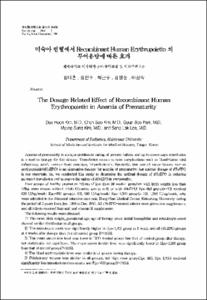미숙아 빈혈에서 Recombinant Human Erythropoietin의 투여용량에 따른 효과
- Alternative Author(s)
- Kim, Chun Soo; Park, Geun Soo; Kim, Myung Sung; Lee, Sang Lak
- Journal Title
- Keimyung Medical Journal
- Issued Date
- 1996
- Abstract
- Anemia of prematurity is a major problem in caring of preterm babies, and up to recent days transfusion is a routine therapy for this disease. Transfusion causes various complications such as blood-borne viral infections, graft-versus-host reaction, hyperkalemia. Recently, the use of recombinant human erythropoietin(rHuEPP) is an alternative therapy for anemia of prematurity, but optimal dosage of rHuEPO is not uncertain. So, we conducted this study to determine the optimal dosage of rHuEPO in reducing postnatal transfusion and to assess the safety of rHuEPO in prematurity.
Four groups of healthy premature infants of less than 34 weeks' gestation with birth weight less than 1.6kg were treated without rHuEPO(control group, n=6) or with rHuEPO:Epo-600 group(n=10) received 600 U/kg/week;Epo-900group(n=10), 900 U/kg/week; Epo-1,200 group(n=10), 1,200 U/kg/week, who were admitted to the Neonatal intensive care unit, Dong-San Medical Center, Keimyung University during the period of 2 years from Jan. 1994 to Dec. 1995. All rHuEPO-treated infants were given iron supplements, and all infants received folic acid and vitamin E supplements.
The following results were obtained.
1) The mean birth weight, gestational age, age of therapy onset, initial hemoglobin and reticulocyte count showed similar distribution in all groups.
2) The reticulocyte count was significantly higher in Epo-1,200 group at 1 week, and all rHuEPO groups at 4 weeks after therapy than that of control group(P<0.05).
3) The mean serum iron level was lower in EPO-treated g개up than that of control group after therapy, but statistically not significant. The mean serum ferritin level was significantly lower in Epo-1,200 group than that of control group(P<0.05)
4) The blood erythropoietin level was similar in all groups during therapy.
5) Phlebotomy volume was similar in all groups, but high-does group(Epo-900, Epo-1,200) received significantly less transfusions than control and Epo-600 group(P<0.05).
6) Any side effects related rHuEPO therapy were not observed in all treated group.
In conclusion, higher dosage(more than 900 U/kg/week) of rHuEPO therapy is safe and effective in reducing the need for blood transfusion.
- Alternative Title
- The Dosage Related
Effect of Recombinant Human Erythropoietin in Anemia of Prematurity
- Publisher
- Keimyung University School of Medicine
- Citation
- 김대훈 et al. (1996). 미숙아 빈혈에서 Recombinant Human Erythropoietin의 투여용량에 따른 효과. Keimyung Medical Journal, 15(4), 334–341.
- Type
- Article
- 파일 목록
-
-
Download
 15-334.pdf
기타 데이터 / 492.55 kB / Adobe PDF
15-334.pdf
기타 데이터 / 492.55 kB / Adobe PDF
-
Items in Repository are protected by copyright, with all rights reserved, unless otherwise indicated.